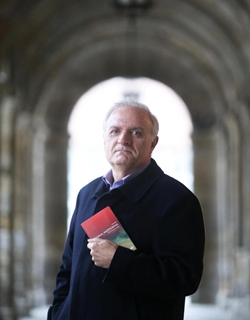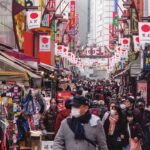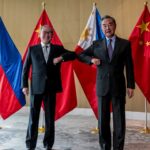Editor’s Note:
This year marks the 100th anniversary of the founding of the Communist Party of China (CPC). After a century’s painstaking efforts, the CPC is leading Chinese people on a path to prosperity. However, as with China’s rise, some Western countries that cannot accept China’s development have tried to taint the image of the CPC. As the Xulio Rios, director of the Spanish Observatory of Chinese Politics in Spain, has paid close attention to China and the CPC over the past decades. How does he evaluate the role the CPC has played in China’s development? Why some Western countries keep making accusations against China? Global Times reporter Chen Xiaohang (GT) talked to Rios.
Editor’s Note:
This year marks the 100th anniversary of the founding of the Communist Party of China (CPC). After a century’s painstaking efforts, the CPC is leading Chinese people on a path to prosperity. However, as with China’s rise, some Western countries that cannot accept China’s development have tried to taint the image of the CPC. As the Xulio Rios, director of the Spanish Observatory of Chinese Politics in Spain, has paid close attention to China and the CPC over the past decades. How does he evaluate the role the CPC has played in China’s development? Why some Western countries keep making accusations against China? Global Times reporter Chen Xiaohang (GT) talked to Rios.
GT: How do you evaluate China’s measures to fight against COVID-19 epidemic?
Rios: The epidemic is a huge challenge. China’s ability to mobilize resources has proven to be much more efficient than the one seen in the majority of Western countries. China shows us that what saves people is the public service system, the great power of the state, and that this can infinitely be more efficient than the private system. Western economies will have to deal with the effects of the pandemic with difficulty this year and this may also affect China insofar as they are trading partners. Therefore, the “dual circulation,” which places emphasis on the domestic economy while coordinating development with the global economy is a right choice.
GT: Former Venezuelan diplomat Alfredo Toro Hardy said the US tried to start a new cold war between China and the US. He said the US is increasingly looking like the USSR during the Cold War and is exhausting itself in a hypothetical conflict. Do you agree?
Rios: If we pay attention to the National Security Strategy released by the US in 2017 and the speeches of Mike Pence and Mike Pompeo, we can see that there are some people in the US who think the best way of preserving hegemony is to apply the script of the Cold War. But by comparing China to the Soviet Union, they ignore the important fact that many China experts in the US argue that “China is not the enemy” and that a different policy should be pursued toward China.
As Alfredo Toro Hardy, who knows Washington well because he once served as Venezuelan ambassador to the US, suggests, it is the US that comes closer to the image of the Soviet Union in a hypothetical war – ideological and political dogmatism, economic stagnation, and high military spending. In recent years, the US has suffered three major setbacks that have severely damaged its international image: the 2008 financial crisis, the chaos of dealing with the COVID-19 epidemic, and the current political instability.
Even though the US is still a strong country and a collapse like the one experienced by the USSR is not foreseeable today, the US is unlikely to maintain its global hegemony. The reasons are due to the growing domestic crisis in the US and a need for greater engagement with other forces in addressing the growing global challenges. The EU should realize that it has a constructive role to play in this process.
GT: From your own observation, what will it be like when the People’s Republic of China turns 100 in 2049?
Rios: China’s policy goal is not to become number one in the world. Contrary to what some might think, we’re not actually watching a game. Being number one in the world is not the result of pure competition, but the result of a country completing the process of modernization, which is more important. If China achieves the goal of modernization, it will naturally become “world number one” given its size, population and international influence. But China is pursuing modernization not because it wants to be number one in the world, but because it wants to achieve economic development and a decent life for its people. China’s modernization will benefit the whole world, because the Chinese people, while working hard at home, are also actively promoting cooperation with other countries. This accumulation process is very different from that of the imperialist countries in the past, and China was also a victim in that period.
In 2049, China will be on a path which adheres to the construction of a fairer society with more balanced development. It can become a country that can counter the hegemonism and militarism of other great powers, and help to build an international community with more cooperative spirit and respect for the development path of both small and large countries.
GT: In recent years, some Western politicians and some US politicians have criticized China, such as, labeling the Belt and Road Initiative as “debt trap,” and accused China of “vaccine diplomacy” and “wolf warrior diplomacy.” What do you think of them?
Rios: This is a reflection of the growing confrontation on many fronts. The key is that China insists on safeguarding its sovereignty. The accusations against China are paradoxical. There is confusion and concern among certain countries’ leaders in the face of the enormous dynamism that China has shown in recent decades. They feel it is necessary to deny China’s development achievements in front of their societies to avoid some people saying “China does better.”
For example, when an US ambassador pressed the administration of a host country to ban Huawei from the 5G construction, they were silent. But when a Chinese ambassador denounced what the US was doing, they raised the tone, as if it was “normal” for the US to put pressure, and they “act in surprise” when China does not bow to US pressure and Chinese technologies have caught up with or even surpassed that of developed countries. As a Spanish proverb says, “Time will arrange every man in his place.” Given how little the outside world still knows about China, the country needs to pay full attention to exerting its soft power influence.
GT: From your point of view, what are the other challenges China is facing?
Rios: I have had the opportunity to travel through various provinces and regions of China and I have always called attention to problems related to social inequalities or regional cohesion. I believe that, as has happened with the environmental issue, in which there has been a spectacular change, today there is more awareness of the need to develop ambitious policies on social development. Undoubtedly, it will require a significant effort lasting decades. China is shifting its development model and expanding its middle class, which will help focus on rural development and thus revolutionize rural areas in the coming years. This will also inject new impetus to the better development of the Chinese economy. China will remain pragmatic and avoid complacency. It is clearly aware that eliminating extreme poverty is not the same as achieving the ideal level of people’s income. Therefore, China will continue to make continuous efforts to improve its work.
Besides, this year marks the 100th anniversary of the founding of the CPC, a big event for China. It is very possible that some will be busy questioning everything that China intends to display as the success of its development. In the eyes of Western liberals, neither China nor the CPC can be seen as a paradigm of success or an alternative, especially now, in the face of a growing systemic crisis in the West.
Xulio Rios, director of the Spanish Observatory of Chinese Politics in Spain




